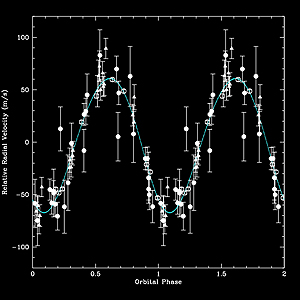MARVELS: Characterizing Extrasolar Planets
The Multi-object APO Radial Velocity Exoplanet Large-area Survey (MARVELS)
MARVELS monitored the radial velocities of 11,000 bright stars, with the precision and cadence needed to detect gas giant planets that have orbital periods ranging from several hours to two years.
With well-characterized sensitivity and a broad range of target star properties, MARVELS provided a critical dataset for testing theoretical models of the formation, migration, and dynamical evolution of giant planet systems. It will have unique sensitivity to rare systems such as extreme eccentricity planets or objects in the "brown dwarf desert."

Artist's conception of an extrasolar planetary system (credit: T. Riecken).

Radial velocity curve of an extrasolar planet discovered by a prototype of the MARVELS spectrograph at Kitt Peak National Observatory.
MARVELS at a glance
- Bright time observations
- Fall 2008 - Spring 2014
- Two 60-fiber interferometric spectrographs (one initially)
- 10,000 main sequence targets, 1,000 giant targets, V=8-12
- 25-35 observations per star over 18 months
- Velocity error 12 m/s at V=10
- Mass sensitivity at P=100 days: 0.35 MJup (V=9.5), 0.7 MJup (V=11.5)
For a detailed description of MARVELS, see section 6 of the SDSS-III Project Description, available as a PDF document.


